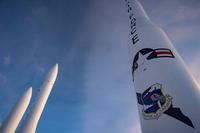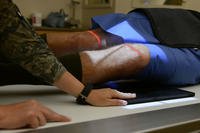For the first time ever, a Space Force Guardian is set to launch into space.
Col. Nick Hague, a U.S. Space Force officer, will blast off on a NASA mission to the International Space Station, or ISS, in August. He will be the pilot on NASA's SpaceX Crew-9 mission aboard the Dragon spacecraft, the service said in a Wednesday press release.
Despite what the public thinks the Space Force does, due in part to the poorly reviewed Netflix series of the same name, the youngest military branch has not been preparing all its members to travel into space.
In 2020, Michael Hopkins, who had been an Air Force officer, became the first Guardian in space when he was sworn into the service in a ceremony aboard the ISS. But a member of the military's youngest service branch has never traveled on a rocket into space. That will change in August.
Hague said in a press release that he couldn't do his work for NASA, in part, if it wasn't for Guardians conducting their important mission of monitoring and protecting America's satellites.
"Being a part of this mission is a unique honor, but it's truly a collective effort," Hague said in the press release.
"Guardians worldwide ensure safe and secure operations of critical systems for launch and on station. From GPS satellites that underpin our station navigation systems, to space domain awareness sites around the globe that help NASA prevent orbital debris from colliding with the space station, to the launch range that my crew will use when we lift off, Guardians provide critical support without which our NASA human spaceflight program wouldn't be possible," he added.
This summer's mission will mark Hague's third visit to space; the other two were completed when he was a member of the Air Force.
The Department of Defense and NASA have a long-standing relationship of supplying military-trained pilots and personnel for space missions. Roughly two-thirds of NASA astronauts have served in the U.S. armed forces, the Space Force said in the press release.
Hague's first mission, in 2018, had a malfunction resulting in an in-flight launch abort. In March 2019, five months later, Hague and the crew launched again and successfully arrived at the ISS. During that 203-day mission, Hague went on three spacewalks, totaling nearly 20 hours, according to the Space Force.
After returning from space in 2019, Hague took a role at the Pentagon for a leadership rotation with the newly developed Space Force as its director of test and evaluation. In 2021, he officially transferred from the Air Force to Space Force, the service said in a press release.
Hague will be joined by Commander Zena Cardman; Mission Specialist Stephanie Wilson; and a Russian cosmonaut, Mission Specialist Aleksandr Gorbunov, on the summer mission, according to the Space Force.
Once Hague and the crew arrive at the International Space Station this summer, he will go from being the pilot to the role of flight engineer. He and the crew will be doing various operations and research studies for six months aboard the station.
Editor’s note: This story has been updated to clarify that Hopkins was the first Guardian in space.
Related: 'I.S.S.' Imagines if War Came to the Space Station. Here's What Could Actually Go Wrong














